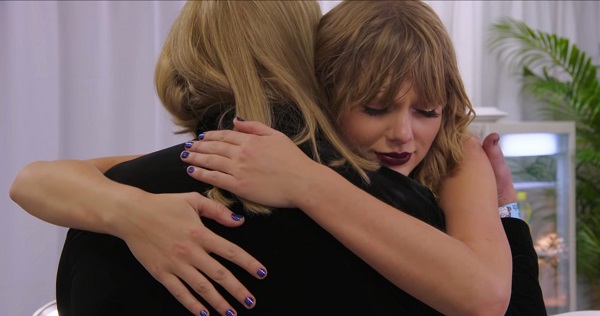
I profess to know next to nothing about music. It’s a very freeing stance to take, and one that I highly recommend. I like what I like because I think it slaps. “Talent,” or lack thereof, is something that I really have no way of judging, and such efforts are probably so futile on my part that I might as well just enjoy what I enjoy.
This means my musical consumption palette probably has a lot of things that would probably be considered to be guilty pleasures, or sneered at by knowledgeable audiophiles. Chief example, I love Taylor Swift’s first five albums. I own copies of each. They some of the only pieces of physical music media I own.
I may not know much about music, but I am aware of the term pop-timism. For the unaware, pop-timism refers to a belief that pop music’s popularity should not discount its worth. Its utopian aims developed out of an opposition to rock-ism, a theory of music criticism which ascertains that the authenticity and art of rock music elevates it over other forms of music. In theory, pop-timism is a form anti-elitism, suggesting that there is just as much inherent artistry in whatever the latest Arianna Grande album is as there was in any music prior, and likely to come. Its critics would argue that it has become a screed rallying for the most popular artists, asserting unassailable worth through mere existence.
In actuality, it exists somewhere in between. The ideas inherent to pop-timism have probably removed some of the pretension of music criticism, but simultaneously has created some strange underdogs. In no way do many of the world’s best-selling acts need music criticism to survive, but pop-timism ensures that they’re going to get it. The strange catch-22 of pop-timism can be seen through the firestorm that occurred when the Grammys (the Oscars but infinitely worse) awarded Beck’s Morning Phase Album of the Year over Beyoncé self-titled album. One of the defenses behind Beck’s victory was the small team that had few producers, while Beyoncé had a small production army (that included many of the industry’s biggest names). Where pop-timism helps here is in the recognition that it too requires artistry to put together an album of the magnitude that Beyoncé has, where not a single note is incorrect. But it’s also very strange to be comparing two things that have distinctly different advantages and disadvantages in their conception.
Beyoncé, however, is a bad example to discuss the realities of pop-timism through. For all intents and purposes, she is so damn talented that she doesn’t really benefit from its insulations, nor is she hindered by it. She is a pop-culture landmark onto herself.
Swift, however, offers a fascinating lens to think about pop-timism. She is the very personality designed to be elevated by pop-timism, which is precisely what drives her legion of anti-fans nuts. Her entire career has been image conscious, painstakingly sanding off the real nasty edges, but leaving quirky ones there. She’s obsessed with the number 13, loves Cats, irritates her boyfriend’s neighbours by messing with the rocks around the property and he just so happens to be a Kennedy. Swift is the pop-cultural version of the greatest tweet of all time:
we’re not your average new american gastropub! we had the bartender with the best handwriting put ‘soup of the day: whiskey’ on the sandwich board outside. we’re a little offbeat. little quirky. but yes to answer your question the cheeseburger is $17 and does not come with sides
— rax king-lalli-music (@RaxKingIsDead) April 16, 2019
A little bit quirky, but not too quirky, and yes, the cheeseburger is $17 and does not come with sides. You need to calm down about it already.
This leads up to the Taylor Swift vanity doc from this winter titled Miss Americana, after one of the premier tracks on her most recent album. In it, we get to see the “real” Taylor Swfit, or at least a version of the “real” Taylor Swift. As far as documentaries go, the film is relatively inert. If you have an inkling of what some of the topics that the film will tackle are, you can pretty much guess which beats are used where. The film at least manages to avoid falling into talking head territory, which makes it far more enjoyable, but it’s nowhere near as experimental or ground-breaking as it could be.
It’s from the meta-angle that Miss Americana is most fascinating. It’s when you try to reconcile with just how much of that supposedly real Taylor is actually real that the film becomes a fascinating piece. Swift is vulnerable about a number of personal details. She talks about her struggles with an eating disorder. She gets political and laments not speaking up sooner. She talks about how much she loves Billy Lynn, fresh off his halftime walk.
I have no doubt that she’s sincere in some capacity about all of these topics. I am willing to buy her decision to ardently oppose the candidacy of Marsha Blackburn as a crucial moment in her life, and that she had routinely been told not to take political sides because of the example set by the eventual collapse of the Dixie Chicks (who absolutely rip by the way). But there’s the nagging suspicion that sits in the back of your head that this is a vanity doc, commissioned as a branding exercise. The reality is a combination of these two dichotomies: what we see is authentic, and we see what she wants us to see.
I said that I love the first five Taylor Swift albums, and I mean it. But somewhere in the transition from country to pop-country to out and out bubble gum pop she lost me. There’s a three-year gap between 1989 her second Grammy winning album, and Reputation, and somewhere in that gap a number of things happen. The old Taylor died to be replaced by a new Taylor, one more of an effervescent pop-brand than previous iterations were. Watching Miss Americana and seeing Swift lay down the initial bars for ME!, the lead single off of her album Lover, it is see where this change arose. What we get is a facsimile of the eventual track, which brushed and coated beyond belief, adding beats and echoes that aren’t there. Swift suggests that her success is predicated on her song writing ability. It’s the argument that I’ve always made for her: each album is a snapshot of her diary over the past two years. But the dairy has progressively felt more airbrushed as time as gone on.
It is difficult to watch Miss Americana and not feel empathy for Taylor Swift in some capacity. This is where the deviation in her music has personally moved me further away from her work. No, I will likely never know what it is like to have millions of people hate you, and that’s precisely the issue. I cannot connect to that head space, no matter how much I feel that Internet mobs are horrible entities, that I wish upon few.
Towards the end of Miss Americana Swift provides a monologue about the unfairness of the industry as it pertains to its treatment of women. She says that the image presented must be an evolution, but a non-threatening one. She’s entirely correct. Like most industries, general pop-culture is not particularly kind to its female stars. But it’s a frustrating revelation to hear from Taylor Swift of all people, someone who made her entire career off of expertly crafting slight devotions to her brand every two or so years. “Mine,” the lead single off of Speak Now is ostensibly the long-lost twin to “Love Story,” one of her biggest hits the previous album Fearless. Again, this is where Miss Americana accidentally shines. Moments like this don’t exactly play out in the way that you would imagine, precisely because you can really only view them through the lens of what you know about Taylor Swift.
The latest evolution for Swift is into the vulnerable and the political realms. To that, I commend her. The catch-22 though is that this evolution is entirely staid, a manicured version of what Swift wishes to present. It is indicative of her entire, both what makes her a globally powerful artist, and an equally exasperating one to many. What is most authentic about Miss Americana is the sinking suspicious that there is a lack of it. We are no closer to solving the mystery of who Taylor Swift really is. We do, however, have a much better grasp on what the brand is at present.
Perhaps that is the “real” Taylor Swift, with all of her actions at this point so brazenly calculated that she’s hyper-aware that each moment will be scrutinized beyond belief. In all honesty, I have a hard time imagining that if many achieved such a level of fame they too would struggle to separate the public persona from the private one. You turn it on, you don’t turn it off, you evolve to slightly different permutations. If it’s the only real you know, does that make it authentic?




